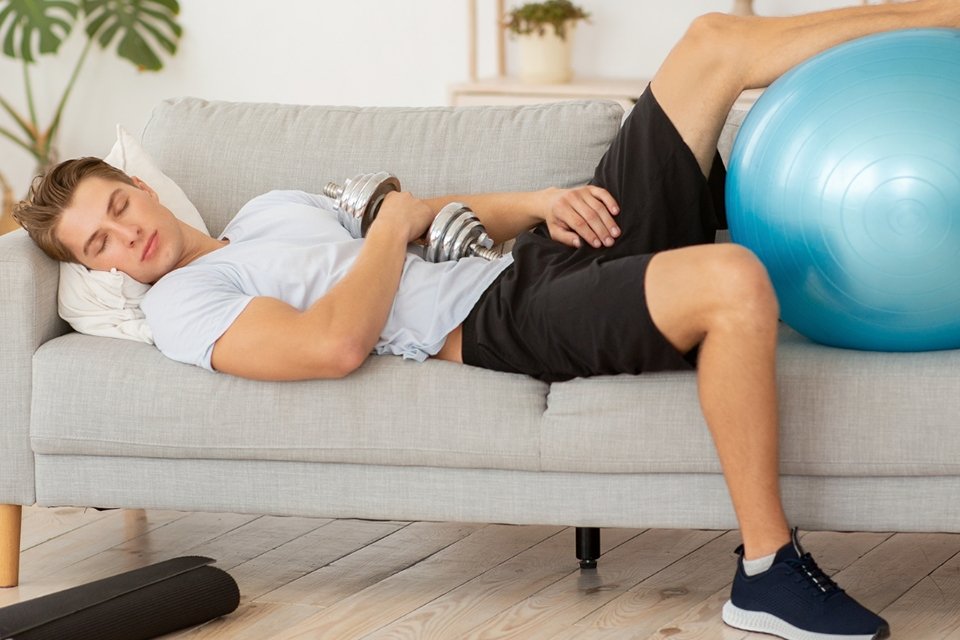9 Things You Must Do for Better Sleep and Muscle Recovery

Do you focus on sleep? Or are you the type of person who tries to burn the candle from both ends, burns the midnight oil, and (if you’re lucky) gets a couple hours of sleep each night? The fact of the matter is, if you aren’t making your sleep a priority, you aren’t able to maximize muscle recovery and growth as well as aligning yourself for effective fat-burning. There are several things you need to look at to ensure better sleep each night.
Getting better sleep should be something you put your focus into as sleep plays a role in hormone balance, cortisol levels, testosterone, stress levels, metabolic rate, muscle recovery and building, and much more. Sleep is the foundation of proper health and ensuring your body (and brain) can function optimally throughout the day. A lack of sleep can cause many issues that you want to minimize and try to eliminate.
But when looking at muscle recovery as it relates to better sleep, if you aren’t getting quality sleep each night, you’re not giving your body enough time to rest and recover from brutal workouts and optimize your hormones to support your muscle-building and fat loss goals. If you aren’t recovering properly and you hit another workout before your body is fully recovered, you’re essentially taking one step forward and two steps backward.
You should be looking to get a minimum of seven hours of quality sleep each night if you want to see any health and fitness benefits – anything less, and you’re basically shooting yourself in the foot (figuratively speaking).
In this article, we are going to look at nine things you must do if you want better sleep quality and muscle recovery. Don’t sleep on these helpful tips!
Minimize Electronics Late at Night
One of the worst things you can do at night is get sucked into the Netflix and Chill mentality of binge-watching your favorite shows. Before you know it, it’s 2am, and you need to be up in three hours. Another rabbit hole you need to ensure you don’t go down is looking through your social media. Don’t fall into the trap of scrolling through your social platforms all night long trying to catch up on what your friends are doing.
Turn off all electronics an hour before bed. This will help eliminate blue light, which can cause your brain to stay active rather than start to ease you in order to help you fall asleep and get better sleep.
Skip Heavy Meals Before Bed
A heavy meal before bed is going to cause your body to get to work breaking down the meal. This can make it difficult to fall asleep and may disrupt your REM cycle and diminish your sleep quality. If you want better sleep and muscle recovery, put your nutritional focus earlier in the day to hit your caloric and macro needs, so you don’t need to stress about it late at night or force you to consume a bunch of calories late at night when you should be focusing on winding down and getting to bed early.
Additionally, all of that food and liquid in your stomach late at night when you’re in bed could keep you awake if you feel bloated or uncomfortable following the meal. The bottom line, skip late-night meals if you want better sleep.
It’s been said for years that a good meal if needed before bed, would be a casein-based protein shake. The slower digestion and prolonged absorption can help feed the muscles and prevent an anabolic state from taking place. But on top of that, it’s really the amino acids that are what is doing the work.
Therefore, supplementing with an EAA (essential amino acid) supplement at night can also be beneficial. GAT Sport Flexx EAAs would be a tremendous nighttime supplement addition to your regimen. Not only are you getting quality amino acids pushed into the system, but you also get hydration properties. This is important as upon waking in the morning, you may be in a slightly dehydrated state due to not consuming any water for the duration of your sleep.
Take Time to Unwind
Have you ever tried to go to bed while you’re stressed and have a bunch on your mind? It didn’t work out too well, right? You probably tossed and turned all night and couldn’t stop thinking about whatever you had on your mind. Well, you need to figure out how to compartmentalize those feelings and thoughts and push them to the side.
While this is easier said than done, it’s something you need to work on doing if you truly want to focus on better sleep and muscle recovery.
Make Sure Your Room is Cool
Did you ever try to sleep when it’s hot, steamy, and you’re lying there in bed sweating while not even moving an inch? If not, consider yourself lucky. The hotter your room is, the harder you may find it to fall asleep. You want a cool (not cold) bedroom to help your body ease into a deep sleep.
To help cool things down, consider wearing lighter clothing, turning on a fan, using different sheets, turning the thermostat down, or opening a window (depending on the season and temperature outside).
Ensure Your Room is Completely Void of Light
Light can keep your brain active. Essentially, it’s something that it focuses on rather than winding down and allowing you to achieve better sleep. Turn off the lights, turn off the television and electronics, and if you have light that sneaks in through your blinds or window shades, consider investing in something like “blackout shades.” They do a fantastic job of eliminating light from penetrating into your room. The key is to purchase shades that fit your window perfectly and do not have any gaps where light can shine in.
If you want a less expensive option, a sleep mask can also do a great job of covering your eyes, so light does not negatively affect your sleep.
Eliminate Any Noise
Just like with light that was mentioned above, you want to eliminate noise. Any type of noise that can be heard in your bedroom can cause your brain to stay active and focus on the various sounds. If you want better sleep and muscle recovery, figure out the source of the noise and eliminate it.
If the noise you’re hearing is traffic, noisy neighbors, or something out of your control, consider investing in a noise machine or earplugs (just make sure they aren’t complete noise-canceling earplugs to keep you safe and have the ability to hear if something is wrong such as a smoke alarm going off).
Wear Something Comfortable
This seems like something that would be common sense, yet some people go to sleep in clothing that is not comfortable and is very constrictive because they think it’s “fashionable.”
It is recommended that you wear something that can help keep your body cool – but not cause you to get cold. Also, you want it to be loose-fitting and not something like compression apparel that somewhat restricts your movement and is super tight.
Use the Right Pillow and Mattress
Using the wrong pillow and mattress can not only prevent you from getting a good night’s sleep, but it can also cause you to wake up stiff and sore the following day. If you want better sleep, visit a mattress retailer and explain to them your circumstance. Discuss your pain points with them, such as waking up with a stiff neck or back pain and showing them how you sleep on a nightly basis. From there, they can give you a professional opinion on what would better suit you and your individual needs.
Just because a pillow or mattress feels good in a store or is recommended by a friend or family member doesn’t mean it’s going to be ideal for you and your sleeping situation.
Try to purchase a mattress that has a 30-day guarantee (or negotiate it into your sale) where if you don’t like it, you can take it back for a refund. And when it comes to pillows, well, expect to go through a few of them until you find the right one. A professional at a mattress retailer should get you pretty close to what you’re looking for in a pillow to ensure you get better sleep, but it will ultimately come down to trial and error.
Have a Sleep Schedule
If you want better sleep, get yourself into a routine and make sure you stick to it. If you go to sleep each night at 11pm, your body will eventually realize this and will start to slow things down and calm your body in preparation for bed. Figure out what time you need to wake up and go back a minimum of seven hours to ensure you get enough quality sleep to help improve muscle recovery and provide some health benefits as well.


